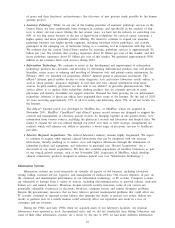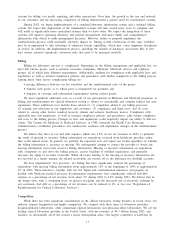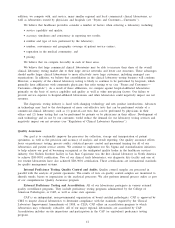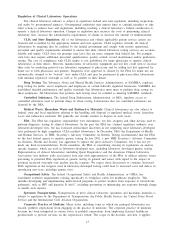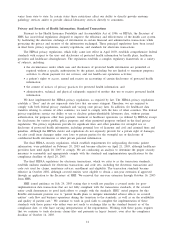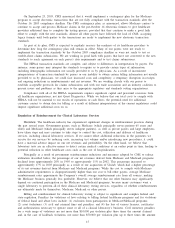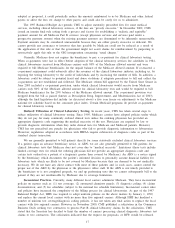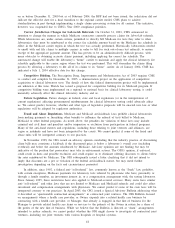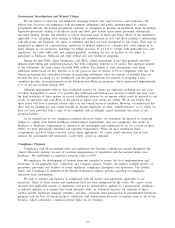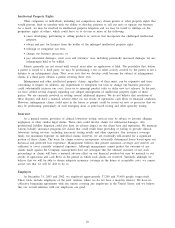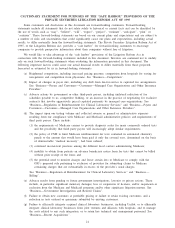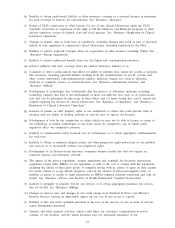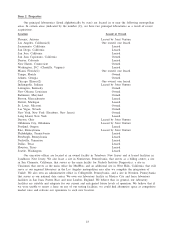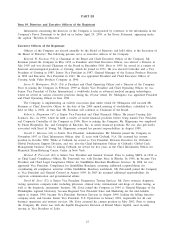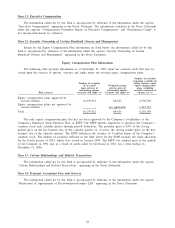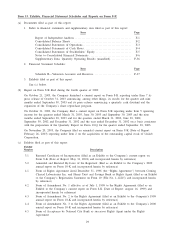Quest Diagnostics 2003 Annual Report Download - page 36
Download and view the complete annual report
Please find page 36 of the 2003 Quest Diagnostics annual report below. You can navigate through the pages in the report by either clicking on the pages listed below, or by using the keyword search tool below to find specific information within the annual report.Government Investigations and Related Claims
We are subject to extensive and frequently changing federal, state and local laws and regulations. We
believe that, based on our experience with government settlements and public announcements by various
government officials, the federal government continues to strengthen its position on healthcare fraud. In addition,
legislative provisions relating to healthcare fraud and abuse give federal enforcement personnel substantially
increased funding, powers and remedies to pursue suspected cases of fraud and abuse. Many of the regulations
applicable to us, including those relating to billing and reimbursement of tests and those relating to relationships
with physicians and hospitals, are vague or indefinite and have not been interpreted by the courts. They may be
interpreted or applied by a prosecutorial, regulatory or judicial authority in a manner that could require us to
make changes in our operations, including our billing practices. If we fail to comply with applicable laws and
regulations, we could suffer civil and criminal penalties, including the loss of licenses or our ability to
participate in Medicare, Medicaid and other federal and state healthcare programs.
During the mid-1990s, Quest Diagnostics and SBCL settled government claims that primarily involved
industry-wide billing and marketing practices that both companies believed to be lawful. The aggregate amount
of the settlements for these claims exceeded $500 million. The federal or state governments may bring
additional claims based on new theories as to our practices that we believe to be in compliance with law. The
federal government has substantial leverage in negotiating settlements since the amount of potential fines far
exceeds the rates at which we are reimbursed, and the government has the remedy of excluding a non-
compliant provider from participation in the Medicare and Medicaid programs, which represented approximately
17% of our net revenues during 2003.
Although management believes that established reserves for claims are sufficient, including qui tam cases,
of which management is aware, it is possible that additional information may become available that may cause
the final resolution of these matters to exceed established reserves by an amount which could be material to our
results of operations and cash flows in the period in which such claims are settled. We do not believe that
these issues will have a material adverse effect on our overall financial condition. However, we understand that
there may be pending qui tam claims brought by former employees or other “whistle blowers’’ as to which we
have not been provided with a copy of the complaint and accordingly cannot determine the extent of any
potential liability.
As an integral part of our compliance program discussed below, we investigate all reported or suspected
failures to comply with federal healthcare reimbursement requirements. Any non-compliance that results in
Medicare or Medicaid overpayments is reported to the government and reimbursed by us. As a result of these
efforts, we have periodically identified and reported overpayments. While we have reimbursed these
overpayments and have taken corrective action where appropriate, we cannot assure investors that in each
instance the government will necessarily accept these actions as sufficient.
Compliance Program
Compliance with all government rules and regulations has become a significant concern throughout the
clinical laboratory industry because of evolving interpretations of regulations and the national debate over
healthcare. We established a compliance program early in 1993.
We emphasize the development of training programs intended to ensure the strict implementation and
observance of all applicable laws, regulations and Company policies. Further, we conduct in-depth reviews of
procedures, personnel and facilities to assure regulatory compliance throughout our operations. The Quality,
Safety and Compliance Committee of the Board of Directors requires periodic reporting of compliance
operations from management.
We seek to conduct our business in compliance with all statutes and regulations applicable to our
operations. Many of these statutes and regulations have not been interpreted by the courts. We cannot assure
investors that applicable statutes or regulations will not be interpreted or applied by a prosecutorial, regulatory
or judicial authority in a manner that would adversely affect us. Potential sanctions for violation of these
statutes include significant damages, penalties, and fines, exclusion from participation in governmental healthcare
programs and the loss of various licenses, certificates and authorization necessary to operate some or all of our
business, which could have a material adverse effect on our business.
19



